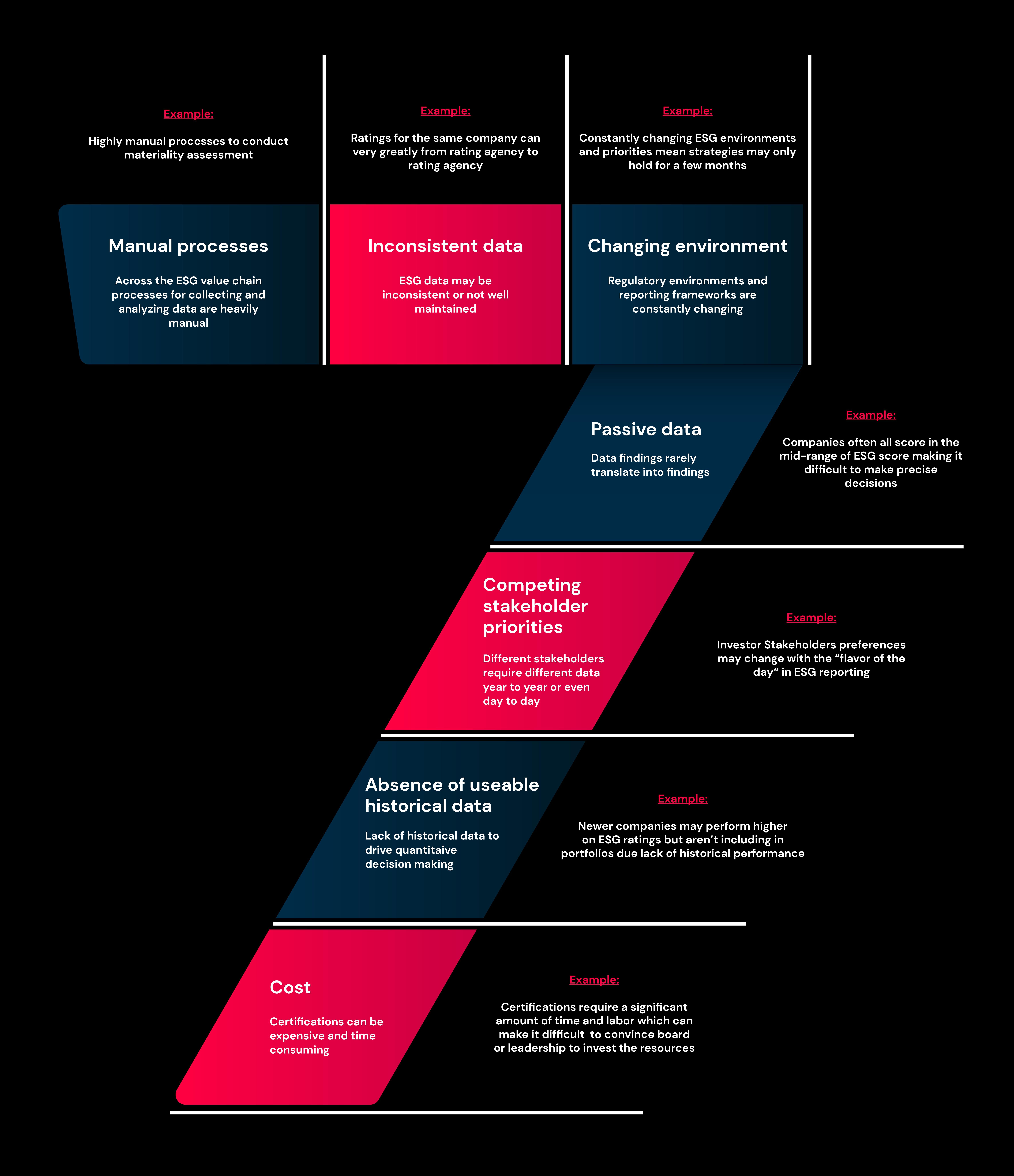With an increasing focus on the environment and increasing climate risk, it is not surprising for businesses to be more transparent with their financial and non-financial reports. A closer inspection reveals that most mid-to-large companies still follow a more ‘hands on approach,’ as most businesses continue to rely on spreadsheets to capture and analyze data across their sustainability initiatives.
Why should you invest in ESG reporting?
With an increasing focus on the environment and increasing climate risk, it is not surprising for businesses to be more transparent with their financial and non-financial reports. A closer inspection reveals that most mid-to-large companies still follow a more ‘hands on approach,’ as most businesses continue to rely on spreadsheets to capture and analyze data across their sustainability initiatives.
The data accumulated in silos across multiple business units becomes difficult to consolidate, and then interpret, making it complicated for businesses to report their initiatives accurately. This hinders their ability to understand their impact on the environment and to take the right decisions. Investing in a sophisticated solution for ESG reporting is critical to ensure seamless data consolidation and to enable transparent reporting.
There are several benefits to investing in ESG reporting. To help you gain a perspective, this blog will explore the following questions:
1. What does ESG mean?
2. Why do we need ESG reporting?
3. What are the benefits of investing in an ESG solution?
4. What are the steps to ensure ESG reporting?
Let us begin with the basics.
1. What does ESG mean?
ESG is an amalgamation of three factors, namely, environment, social, and governance.
Let us understand it further. The ‘environment’ aspect of ESG takes into its account use of a company’s resources. It focuses on factors like energy efficiency, carbon emission, water quality, waste management, etcetera.
Similarly, the ‘social’ side of things explores how a company manages its people and promotes a positive working environment. Diversity and inclusivity, employee engagement, customer satisfaction, privacy, human rights, labor rights are some of the areas that fall in this category.
The governance’ bit focuses on internal processes, practices, and procedures. Preventing and recording violations, ensuring transparency, delivering as per industry regulations and best practices and more are a few areas that fall in this category.
Together, reporting on each of these areas forms the crux of ESG reporting, allowing businesses to gain better financial growth, manage volatility, reduce cost, and ensure top-line growth.
2. Why do we need ESG Reporting?
According to the Global Sustainable Investments 2018-2020, at the start of 2020, global sustainable investment reached USD35.3 trillion in five major markets namely, the United States, Japan, Australia, Asia and Canada. We witnessed that from 2018 to 2020, there has been a 15% increase and a 55% increase from 2016 to 2020.
One of the key drivers of this shifting trend is the fact that businesses with robust ESG reporting demonstrating better financial performance and resilience to market disruptions. In other words, socially responsible investing can help a company in the long run.
Furthermore, Harvard Law School Forum on Corporate Governance states that investors, asset managers, and other stakeholders increasingly rely on ESG reports and ratings to assess and measure a company’s performance. However, investors face critical challenges when it comes to carbon accounting, which is a part of ESG. These challenges are illustrated be
Seven key challenges in carbon reporting

Executed well, ESG reports help businesses with quantitative and qualitative disclosures based on factors that include:
- Environment: climate change, carbon emissions, deforestation, pollution, energy efficiency.
- Social: data protection and privacy, gender and diversity, employee engagement, community relations, customer satisfaction.
- Governance: Board composition, audit committee structure, bribery and corruption, executive compensation, whistle blowing policy.
By summarizing their impact in the areas in the aforementioned section, businesses stand to gain by streamlining their initiatives and be more transparent to their key stakeholders that include customers, investors and most importantly, employees.
3. What are the benefits of investing in ESG?
Investing in ESG reporting lets businesses be more tuned into their shareholders’ interests and improve the bottom line.
According to a recent PwC research, 65% of investors stated that employing
Other advantages of ESG reporting include:
- Growth opportunities: Utilizing a strong ESG proposition helps companies expand and enter new markets. This is because authorities are trust corporates which make necessary approvals seamless, that makes it easier to explore new opportunities for growth.
- Benefits finance: Due to the pandemic, we witnessed a shift in investment patterns, where companies were more inclined towards investing in the environment. Debunking the myth that sustainability investment leads to weaker returns, Institutional Investor’s report suggests that the pandemic demonstrated that ESG funds have outperformed between March 2020 to March 2021. They also reported an average growth of 27%.
This essentially means that the ESG funds passed stringent tests involved in assessing the sustainability status of a company, improving its proposition to attract more investments – even in the post-pandemic world. - Cost reduction: ESG can help companies reduce their costs by a large margin by combating rising operating expense such as the cost of water or raw materials. By utilizing the three metrics namely environment, social and governance, companies can streamline resource procurement and avoid wasting precious resources in the process.
- Less volatile investment: Reducing risk exposure is crucial when you invest. That is why ESG investment is an excellent option for you. Companies with high ESG score have demonstrated reduction in their overall portfolio volatility along with lower fluctuations due to additional risk filtration.
ESG also helps reduces the risk of high-profile negative events. There have been several incidents in the recent past when news on sub-par working environment for employees led to devaluation of a company’s stock, having a direct impact on the bottom line. Implementing industry best practices and then reporting on them let’s businesses monitor such issues that protects them from such incidents in future.
4. What are the steps to ensure ESG reporting?
Here is a checklist that you can follow:
- Focus on building an internal team to work on a reporting framework to address ESG issues, initiatives, targets, performance metrics, and internal and external reporting standards.
- Conduct a materiality assessment to evaluate the importance of sustainability issues relevant to various stakeholders.
- Partner with an ESG consultant who can help map your ESG requirements. Typically, these consultants also provide value add resources and insights that helps in narrowing down reporting requirements as per stakeholder priorities.
- Develop a communication strategy to propagate your company’s ESG management framework and reporting for external and internal stakeholders.
We hope the pointers discussed in this blog were helpful for you to invest in an ESG reporting solution. Eka Sustainability and ESG reporting solution leverages its cloud platform to help businesses across the board meet their sustainability goals. To know more about our cloud-based reporting solution, visit us here.
Other resources

Value-based sustainability reporting: Measure true performance
Today, companies are under greater pressure to generate data, assess their sustainability performance, and publicly make this information available.

Eka sustainability solution
Organizations often struggle to visualize reporting of accurate data across multiple global standards which they need to comply with, impeding the full potential of their sustainability strategy and program.

Today, companies are under greater pressure to generate data, assess their sustainability performance, and publicly make this information available.

Organizations often struggle to visualize reporting of accurate data across multiple global standards which they need to comply with, impeding the full potential of their sustainability strategy and program.
